Chad. Restoring Dignity.
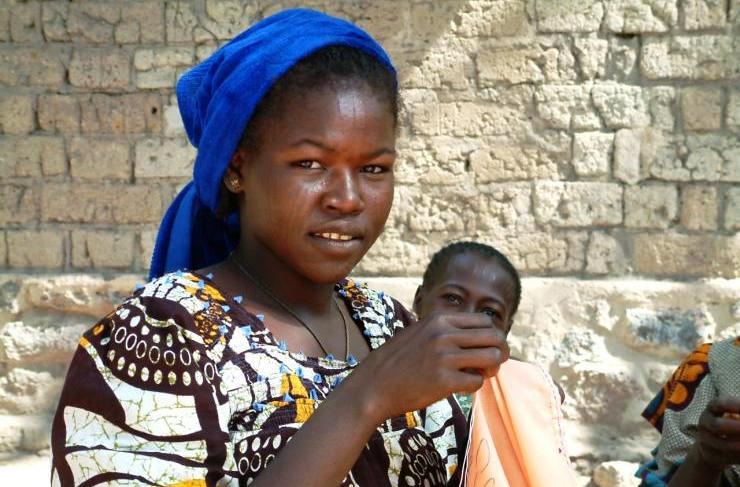
In the southern region of Chad, in Bodo, to be exact, an African fashion project is coming to life to offer women the opportunity to earn a living by working in a sewing atelier. Sister Paola Letizia who heads the project, tells us about it.
Their names are Paterne, Brigitte, Priscilla, Janette, and Eliane and they are five nembadje, a word which in ngambay (Chadian language) means ‘queens’. They are queens for their bearing, their innate elegance, the clothes they wear, their colourful headdresses and the taste they demonstrate. Every morning they emerge from their houses with walls made of dried earth, straw, and cow dung, with a sheet of metal for a roof, and “they come to my school with such natural elegance that they seem ready for a fashion show. They convinced me to put my dream into practice: opening an atelier for the production of African fashion accessories”, admits Sister Paola Letizia Pieraccioni, Italian missionary of the Alcantarine Franciscan nuns and director of the École Catholique Associée (ECA) of Bodo, a rural village in southern Chad.
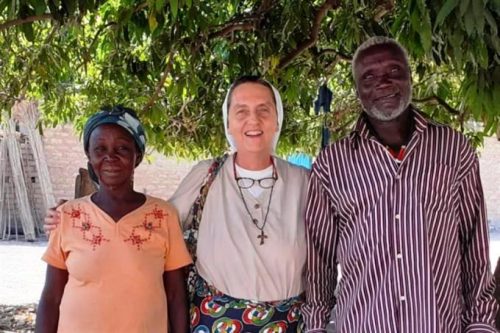
Sister Paola Letizia Pieraccioni with a married couple in the Bodo area. File swm
Paterne, Brigitte, Priscilla, Janette and Eliane are all teachers at her school, but for some months now, they have also been the first seamstresses of the workshop that Sister Paola Letizia opened in the Chadian bush with one objective: to challenge fragility, here personified in women. And so, thanks to the contribution of some friends, five sewing machines were purchased with the material required to get started, and thanks to a room made available by the parish priest, the atelier came to life.
Sister Paola Letizia created this project with a very ambitious ultimate goal: to defeat the alcoholism that grips local society, a phenomenon in which women play a central role. Yes, because they are the ones who produce the alcoholic beverage that is consumed by the litre and that empties the millet granaries. On the other hand, for them, this is one of the few jobs that allows them to earn that little bit of income essential for family expenses.
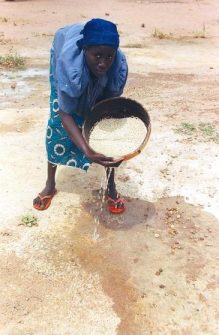
Bilibili is an alcoholic drink made from fermented millet. File swm
“I understood – explains the missionary – that the redemption of women’s dignity starts from an economic redemption. The fact that they are not financially independent, but depend on their husbands who leave all the expenses of the family household on their shoulders, forces them to do anything to earn some immediate money. Those who do not produce bilibili, i.e., the alcoholic drink made from fermented millet, even sell their bodies, an increasingly frequent phenomenon even among adolescents: men take advantage of this economic poverty and the consequences are many, on a moral, spiritual and health level and also socially, due to unwanted pregnancies”.
The condition of women in Chad, especially in rural areas, is one of submission in the marital relationship, which often leads to states of oppression or episodes of violence.
The Church is committed to the promotion of women to restore their dignity, starting with that economic autonomy which is fundamental to free oneself from all slavery. Unfortunately, polygamy is also widespread in this area of Chad: with second marriages by men, first wives find themselves abandoned with their dependent children. “And to eat and survive they have to earn something quickly, they turn to the production of bilibili because the demand is high, given that everyone drinks!”, observes Sister Paola Letizia who is also responsible for the diocesan Committee for the fight against alcohol-related evils.
The team visits all the parishes of the diocese of Doba and does a great job of prevention and awareness, with listening groups, especially for young people, but it also visits primary schools because the scourge of alcoholism spreads across the entire population and it is a dominant factor of moral degradation and poverty. “If they made polenta with that millet used to make the drink, there would be even fewer food problems given that here the food is barely enough for subsistence,” the sister remarks. But how can we motivate these women and convince them to stop producing bilibili?
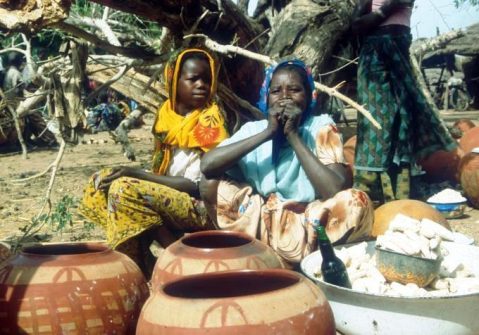
At the market in Bodo. the demand for Bilibili is very high. File swm
The African fashion atelier project is Sister Paola Letizia’s answer to this question and the attempt to pull the plug on the phenomenon of alcoholism, offering women an alternative income. “In the daily exchange of glances with the young people I meet – confesses the nun – my heart as a woman and as a consecrated person is increasingly compassionate: if I think about the way people see me, I have not seen people looking in the same way on the young and teenage girls or the women of Chad. The beginning of this project is in the heart, from woman to woman, but it is also in the sense of injustice that I experience firsthand because if you love a people, the one who wounds their heart, also wounds your heart and your dignity”. And so, Sister Paola Letizia set out to challenge fragility: to start the atelier, however, “I couldn’t start with the women who make bilibili, because unfortunately I can’t guarantee them an immediate profit: it takes time, both to learn to sew and to market the products made. I started with the teachers of the school of which I am director because they already have a fixed salary for their work and therefore can trust the project which in the initial phase does not have an instant economic return”.Certainly, the marketing of the artifacts is still to be developed: for this reason, everything “depends on Divine Providence, also on our hopes, our courage and perhaps even a little recklessness”, Sister Paola Letizia adds.
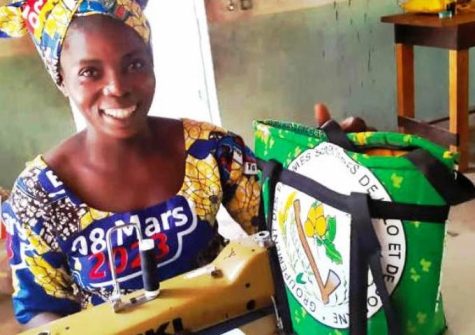
Brigitte with one of the bags she has made. Photo PM
Certainly, the project is a challenge to fragility because it is designed for people seen to be on the margins of Chadian rural society (such as women) but also because the pillar of the atelier is Auguste, a disabled man forced to live in a wheelchair, whom the Sisters have helped since he was a child: after a cutting and sewing course, he became the village tailor and today he is the cornerstone of the African fashion project. He is the manager of the atelier, the one who has to kneel on the mat to cut the fabrics and design the models. He cannot go and check the work of the young seamstresses. He is fragility personified. But it was for people like him that the tailoring shop was organized, precisely according to his needs. Auguste, if he had not found the support and love of the nuns, would no longer be alive like all children who are born with serious malformations and disabilities, because here the social context does not provide any type of assistance and the daily living conditions are so harsh that they do not allow those who are not self-sufficient to survive. Furthermore, traditional religion sees witchcraft in every anomaly: this is also why families tend to remove or, worse, eliminate disabled children. Auguste, with his personal, social, and professional success, is a living challenge to fragility, just like ‘his’ atelier. (Open Photo: swm)
Chiara Pellicci/PM



